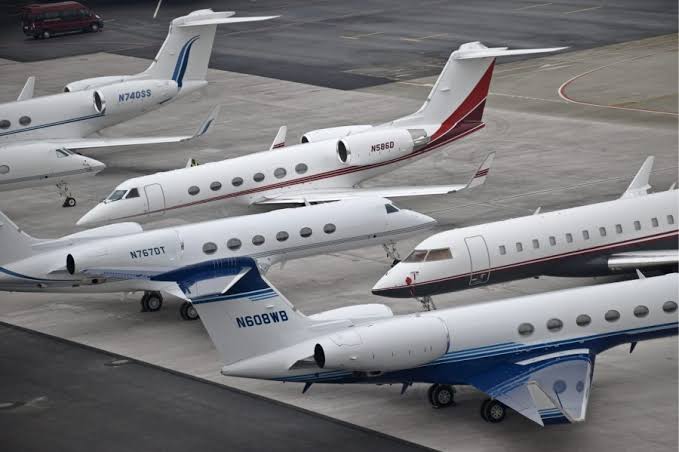Due to unpaid import duties totalling several billions of naira, the Federal Government, acting through the Nigerian Customs Service (NCS), plans to ground more than 60 private planes that belong to well-known citizens of the nation.
AFRIPOST gathered that the enforcement is set to start today, October 14, 2024.
According to documents that The PUNCH was able to receive from the NCS and the Nigerian Airspace Management Agency, a large number of private jet owners have neglected to pay import duties, which is why this enforcement action was taken to recoup the unpaid amounts.
This judgement comes after the NCS evaluated private jet ownership and duty payments during a one-month verification operation that took place between June and July of this year.
Despite the verification, several private planes remain non-compliant, prompting today’s grounding action.
Notably, several of the jets involved in this incident belong to notable corporate leaders, including bank executives.
The NCS has already contacted some private plane owners, and more are anticipated to get letters today.
The majority of the planes affected by the grounding are registered in other countries but owned by Nigerian citizens.
Several Bombardier models, notably the Bombardier Challenger 604 and Bombardier BD-700 Global series, are among the luxury aircraft mentioned, each priced in the tens of millions of dollars.
As of Sunday, 11 aircraft owners had been notified of the planned grounding, with another 55 set to get notice by the end of the day.
According to reports, several plane operators sought to push the President to intervene, but their efforts were fruitless.
As a result, some owners have begun to settle import duties to escape the clampdown.
For example, operators of a Gulfstream G650ER registered in the United States reportedly paid N5.3 billion in import charges to evade penalties.
A similar action in 2019 resulted in the recovery of duties from many plane owners.
This present effort is projected to generate considerable money for the government, perhaps exceeding N260 billion.
While some aircraft owners have already begun discussions with the NCS to clear their debts, others have pledged to do so whenever their aircraft returns to Nigeria.
Officials confirmed, however, that at least three planes had already flown out of the country to dodge the grounding, but would face restrictions when they return to Nigerian airspace.
The Nigerian Customs Act of 2023 authorises the NCS to penalise owners of commodities, including private planes, that are imported without correct customs being paid.
Demand notices have been sent, and the NCS has asked the Nigerian Civil Aviation Authority and the Nigerian Airspace Management Agency to refuse flying permission to non-compliant aircraft.
The NCS verification program was implemented when it was revealed that several private planes in Nigeria were operating without paying the necessary customs charges.
In July, NCS Comptroller General Adewale Adeniyi reported that numerous planes had departed the nation ahead of the operation, presumably to evade verification.
He emphasised that, while some aircraft are temporarily in Nigeria, those employed for domestic purposes must pay charges by international aviation standards.
The government has been seeking for three years to reclaim unpaid import duties from private jet operators, some of whom have utilised technical loopholes to evade payment, such as acquiring Temporary Import Permits (TIPs).
The TIP enables planes to fly in Nigeria temporarily, but many operators have taken advantage of this loophole, renewing their permits indefinitely.
Customs officers have described the TIP system as a loophole that allows private jet owners to avoid import tariffs, which are generally five per cent of the aircraft’s worth.
Many owners have been unwilling to pay these large sums, preferring to take advantage of the reprieve offered by international legislation.
However, the current Customs leadership looks intent on closing these loopholes and recovering all outstanding charges.


